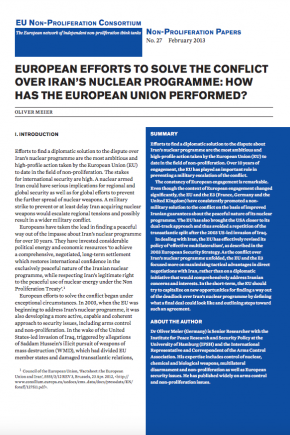European Efforts to Solve the Conflict over Iran’s Nuclear Programme: How has the European Union Performed?
Efforts to find a diplomatic solution to the dispute about Iran’s nuclear programme are the most ambitious and high-profile action taken by the European Union (EU) to date in the field of non-proliferation. Over 10 years of engagement, the EU has played an important role in preventing a military escalation of the conflict. The constancy of European engagement is remarkable. Even though the context of European engagement changed significantly, the EU and the E3 (France, Germany and the United Kingdom) have consistently promoted a nonmilitary solution to the conflict on the basis of improved Iranian guarantees about the peaceful nature of its nuclear programme. The EU has also brought the USA closer to its dual-track approach and thus avoided a repetition of the transatlantic split after the 2003 US-led invasion of Iraq. In dealing with Iran, the EU has effectively revised its policy of ‘effective multilateralism’, as described in the 2003 European Security Strategy. As the conflict over Iran’s nuclear programme unfolded, the EU and the E3 focused more on maximizing tactical advantages in direct negotiations with Iran, rather than on a diplomatic initiative that would comprehensively address Iranian concerns and interests. In the short-term, the EU should try to capitalize on new opportunities for finding a way out of the deadlock over Iran’s nuclear programme by defining what a final deal could look like and outlining steps toward such an agreement.

